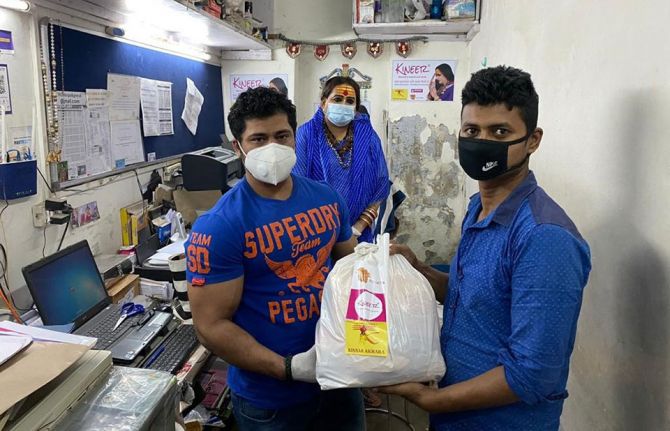

Feature Story
Solidarity fund helping transgender people during the COVID-19 pandemic
30 March 2021
30 March 2021 30 March 2021As the COVID-19 pandemic continues, the ongoing global health crises and resulting economic consequences of the measures imposed to contain COVID-19 have highlighted the vast and rapidly growing inequities threatening the livelihoods of the most vulnerable.
This has been especially true for transgender people around the world, who have disproportionally borne the socioeconomic hardships of the pandemic. Speaking about the transgender community in India, transgender activist Laxmi Narayan Tripathi said, “People didn’t have money to pay rent. Not even to buy rice. People may die of COVID-19, but they may die of hunger even sooner.” The Kineer Services, an initiative created by Mrs Tripathi focusing on creating employment for the transgender community in India, organized and created a platform to provide food to the transgender community across several states in India in order to tide people over the immediate hardship. Sustainable support, however, is a challenge. “What else would be better than us empowering our own people, those that are living on the margins of society, to become entrepreneurs?” Ms Tripathi added.
Recognizing that access to finance is a critical factor towards supporting vulnerable populations to survive the immediate crisis and the impact of lockdowns, UNAIDS and partners launched the Solidarity Fund for Key Populations Social Entrepreneurships and will support eight proposals for transgender-led social enterprises in its pilot phase. The pilot is being rolled out in Brazil, Ghana, India, Madagascar and Uganda. It will finance a series of selected social enterprise grants led by key populations, which will be announced in early April.
“The solidarity fund is a small step towards addressing the economic inequities faced by transgender communities. It is about building and supporting entrepreneurs from within the transgender community to address the extreme discrimination and vulnerability that the transgender community faces,” said Pradeep Kakkattil, Director, Office of Innovations, UNAIDS
The variety of social enterprises received through the solidarity fund’s first proposal call from transgender communities is a testament to the ingenuity of community-led organizations in the face of special hardship. In Uganda, Tranz Network Uganda has established the Transgender Resilience and Economic Empowerment (TREE) pilot programme in order to contribute to the economic transformation of transgender people in Uganda. The TREE project will build social capital and the resilience of transgender people in Uganda through the formation of saving groups, the promotion of financial inclusion, entrepreneurship, vocational skills development and linkages to other social economic empowerment activities.
The selected applicants for the pilot phase of the solidarity fund have shown how civil society organizations and networks are playing a critical role in providing essential social safety nets for vulnerable communities and transgender populations during the pandemic.
In Ghana, the Hope Alliance Foundation (HAF) and the OHF Initiative have been working together for the past nine years on implementing numerous HIV-related programmes that include emergency support, home-based care, capacity-building and peer support. As the ongoing pandemic and the subsequent lockdowns continue to heavily impact the Ghanaian labour market, particularly vulnerable workers, HAF and the OHF Initiative are aiming to address the resulting economic challenges through capacity-building programmes and the implementation of income-generating activities. Through the Community Economic Empowerment Program, the two organizations will work with lesbian, gay, bisexual, transgender and intersex people and people living with HIV to provide them with vocational skills training and to revitalize small- and medium-sized business that have been adversely impacted by the economic downturn due to COVID-19-related lockdowns.
In Bihar, India, Reshma Prasad sees a unique opportunity for the transgender community, which has developed unique skills in dancing, singing, art and entertainment within the local culture and across the country. Through Nachbaja, Ms Prasad wants to bridge the current gap between transgender communities and digital media by providing a centralized online platform on which they can market their skills, allow people to directly connect with the artists themselves and provide the artists with an opportunity to receive fair pricing and wider exposure for their services. Nachbaja.com has already registered more than 1000 artists for its platform and aims to grow the platform to reach all of India.
In Brazil, Grupo De Trabalhos em Prevenção Posithvo (GTP+) has been supporting people living with HIV by providing them with food security since 2016 through their Cozinha Solidaria (Solidarity Kitchen). Noticing a vast and sudden drop of the income of their beneficiaries in the past year due to the ongoing pandemic and related lockdowns in Brazil, GTP+ saw a unique opportunity to combine their knowledge of confectionary and gastronomy with entrepreneurial ventures for their beneficiaries. Through Confeitaria Escola–Cozinha Solidária (Confectionary School–Solidarity School), the organization will aim to commercialize and grow its operations by creating confectionary and food baskets for commemorative occasions while proving relevant entrepreneurial training guidance for all members.
“UNICEF recognizes the critical importance of HIV prevention among young key populations if we are to end the AIDS epidemic. We believe that this can be best accomplished by empowering communities directly. The solidarity fund is a unique resource that will do just that. For young people, these investments will yield lifelong opportunities,” said Chewe Luo, Associate Director and HIV Programme Chief, United Nations Children’s Fund.
As transgender communities become increasingly marginalized, especially during the ongoing global pandemic and subsequent lockdown measures, UNAIDS is committed to eradicating all forms of discrimination faced by transgender communities and stands behind them to drive workplace equality forward.
Our work
Related
 Government ensures continuity of treatment in Malawi
Government ensures continuity of treatment in Malawi

10 February 2025


